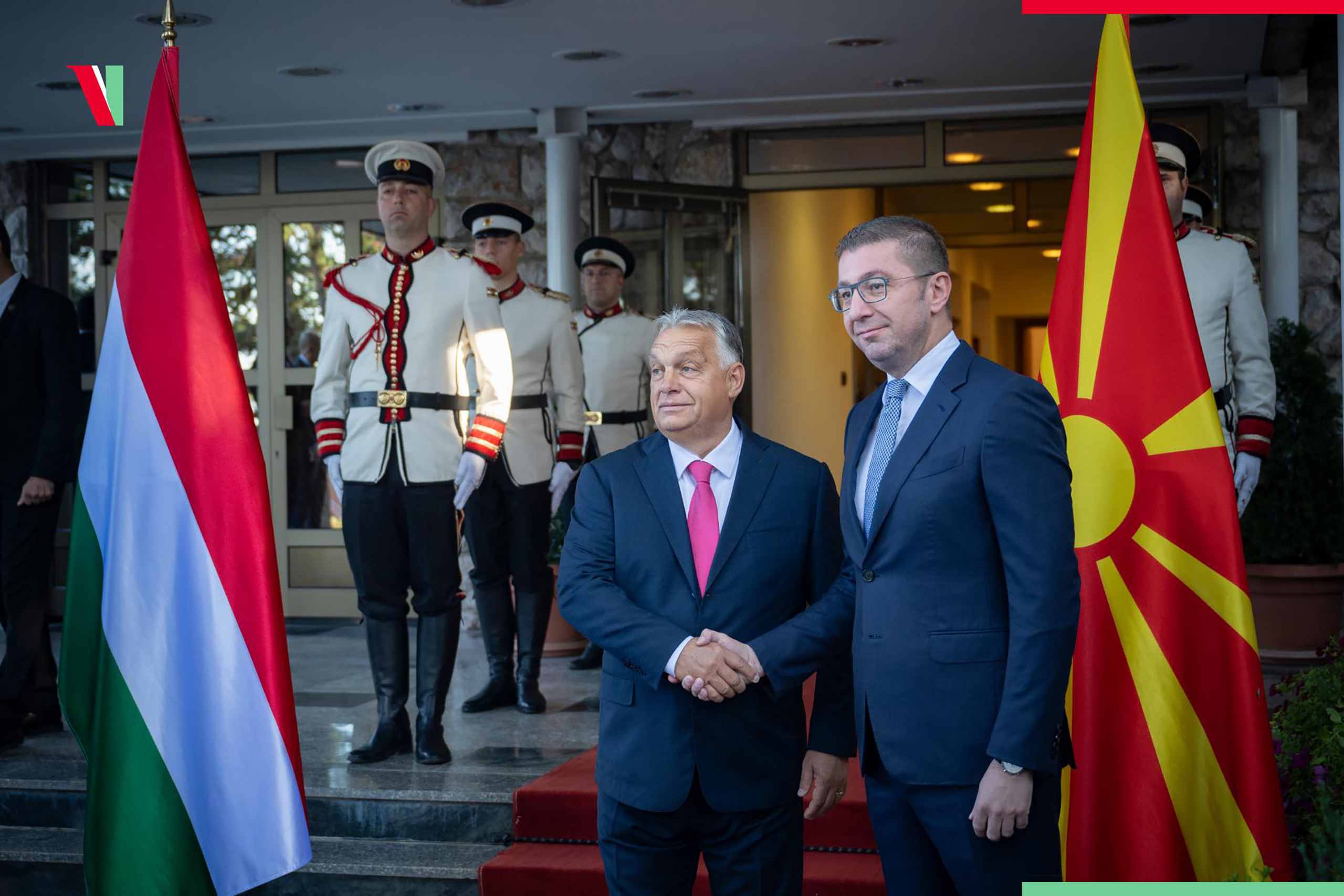Viktor Orbán has offered mediation in the dispute between North Macedonia and Bulgaria. And, although the prospects of the initiative seem rather dubious, other steps being made by Budapest in the Macedonian direction could lead to Hungary’s increased influence on North Macedonia, and, ultimately, on the entire Western Balkan region.
The Gruevski case
For Hungary, the region of the Western Balkans / former Yugoslavia is an area of national interest. Geographical, historical, economic, social and political connections determine the significant influence Budapset retains on the developments in this part of Southeast Europe. Moreover, this influence has its own features for each country across the region. Budapest may focus on the Hungarian diaspora, business projects, or cooperation at the level of political leaders, which is usually reinforced by economic cooperation.
North Macedonia is close to Hungary through political ties.
Six years ago, the scandalous escape of the ex-head of the Macedonian government and former leader of the Internal Macedonian Revolutionary Organization – Democratic Party of Macedonian National Unity, VMPO-DPMNE, Nikola Gruevski, and Viktor Orbán’s government in Hungary granting him political asylum reached the European level.
In his homeland, Gruevski was sentenced to two years in prison for abuse of office during an armored Mercedes purchase worth more than EUR 500,000. The former prime minister, meanwhile, claimed that he became a victim of political persecution by the then government led by the Social Democratic Union of Macedonia, SDSM. The specialized Hungarian immigration and asylum office agreed with his arguments.
The return of VMPO-DPMNE to power in North Macedonia this year implied a warming of Macedonian-Hungarian relations. The outlooks varied – from Gruevski’s return to Macedonian politics to the alignment of Skopje’s foreign policy with that of Budapest. It was also assumed that the Hungarian presidency of the European Union in the second half of 2024 should contribute to the unblocking of the North Macedonia’s European integration according to the scenario drawn by VMPO-DPMNE politicians, that is, without painful compromises with the Bulgarian side.
Bulgarian veto
It should be recalled that Bulgaria vetoed the European integration of North Macedonia four years ago due to disputes over the history, language, and national identity of Macedonians in general. In 2022, Skopje (where SDSM was in power at the time) and Sofia agreed on the so-called the “French accord”, according to which Bulgaria was supposed to unblock the European integration of the neighboring country once North Macedonia includes the “Bulgarian minority” in the text of the constitution.
This year, VMRO-DPMNE came to power in Skopje, having won both the presidential and parliamentary elections. Rejection of compromises in matters of national identity was at the top of their campaign agenda. It is natural that no amendments were made to the constitution.
The representatives from VMRO-DPMNE emphasized that they are committed to European integration, ready to go for concessions to Bulgaria, but willing to adjust the agreements already reached by the previous government, making them fairer.
Skopje proposed to adopt constitutional changes with a delay, so that the constitutional amendments regarding Bulgarians come into force only after the issue of North Macedonia’s accession to the European Union is resolved positively.
It was assumed that Hungary’s presidency of the EU could help the Macedonians convey their point of view to the European bodies and adjust the already approved agreement.
However, late in the evening on September 25, the Committee of Permanent Representatives of the EU (Coreper) decided to split the accession paths for Albania and North Macedonia. According to the decision, Albania will be able to launch official accession talks as early as mid-October.
At the same time, the negotiation process for North Macedonia remains on hold. The conditions for the start of accession talks for Skopje have not changed – it is necessary to fulfill the criteria agreed with Bulgaria and approved by the European Council, which, in particular, provide for the adoption of constitutional changes on the recognition of Bulgarians as a nation-building people. So this is about the same concessions to the Bulgarians against which the ruling VMRO-DPMNE stands.
Orbán the peacemaker
Among other things, the EU’s latest decision not to open negotiations with Skopje demonstrated that Budapest has not enough influence to significantly change Brussels’ position on the Macedonian issue.
The EU’s decision to “separate” the European integration paths of Albania and North Macedonia was adopted just before the visit of Hungarian Prime Minister Viktor Orbán to North Macedonia. It is possible that the trip was scheduled for these dates (September 26-27), including, in order to support VMRO-DPMNE, a force friendly to Orbán’s Fidesz.
During the visit, Orbán spoke a lot about Hungary’s support for North Macedonia’s European integration aspirations and sharply criticized the EU.
The fact that North Macedonia found itself lagging behind Albania on the European integration path the Prime Minister of Hungary called a “historic error squared” on the part of the EU, and accused officials in Brussels of suppressing the “national pride” of North Macedonia, delaying the process of its European integration.
As practical help to the Macedonians, the head of the Hungarian government offered his mediation in the negotiations between Skopje and Sofia.
“I have my own proposal and I conveyed it to Prime Minister Mickoski. I told him we are ready to use the EU presidency and mediate on the issue,” Orbán said during a joint press conference with Mickoski, adding that it is about “finding a solution that would suits both Macedonians and Bulgarians.”
The proposal put forward by the Hungarian prime minister sparked no euphoria in Skopje. When asked by journalists whether the prime minister of Hungary, whose country currently presides over the European Union, can help on the European path, the head of the Macedonian government dodged a direct answer.
Bulgaria’s reaction only confirmed skepticism prevailing among the Macedonians.
“The European agreement with the Republic of North Macedonia is clear. Bulgaria does not need mediators in this process,” the Acting Minister of Foreign Affairs of Bulgaria, Ivan Kondov, told journalists, commenting on the idea of mediation proposed by the Prime Minister of Hungary.
On September 28, the Ministry of Foreign Affairs of Bulgaria announced that the top diplomat, who was in New York, discussed Orbán’s proposal with his Hungarian counterpart Peter Szijjártó. As emphasized in the commentary, Kondov assured Szijjarto that “mediation is not necessary” in order to convince the Republic of North Macedonia to “fulfill the criteria for launching negotiations” on joining the EU.
Ex-Prime Minister of Bulgaria Kiril Petkov, commenting on Orbán’s idea, told journalists: “The French accord” that we concluded during our government’s work turned out to be really good for Bulgaria. The entire European Union sided with Bulgaria. The Republic of North Macedonia must decide whether it wants to include the Bulgarian in its Constitution, or whether its path to Europe will be shut.”
Good loan
It can be stated that Orbán’s mediation mission ended before it even started. But this doesn’t mean that Macedonian-Hungarian relations will worsen, or that Hungary will reduce its efforts in the Macedonian direction.
First, it seems that the mediation idea was initially conceived more as a PR stunt than a real action plan.
Secondly, Budapest clearly decided to change the focus in relations with Skopje, choosing for the main track the issue of money over some complicated domestic or foreign political issues.
A few weeks before Orbán’s arrival, the reports came that Hungary (Hungarian Export-Import Bank) is providing North Macedonia with an unprecedented preferential loan of EUR 500 million. While the Macedonian opposition assures it is a corrupt project for which money is allocated by China, Budapest has denied the Chinese origin of the funds.
Once finally approved, the loan should certainly become a powerful basis for even closer Hungarian-Macedonian cooperation. The loan will bind Skopje and Budapest no less tightly than Hungarian mediation in the dispute with Sofia. Huge public debt obligations form such interstate ties that a modern European nation will not be able to quickly and completely get rid of even in the event of a power change.
European analysts state that in this way, Orbán “buys up influence” in a geopolitically strategic region for Hungary and ensures loyalty of the elites in the country which may one day become a member of the EU and is already a NATO Ally.
Also, in conditions where the policy pursued by Budapest very often diverges from the official stance of the EU, while being loyal to Moscow and Beijing on a number of issues, the strengthening of Hungarian influence on North Macedonia and the Western Balkans in general would imply an indirect strengthening of China and Russia’s weight in the region.



